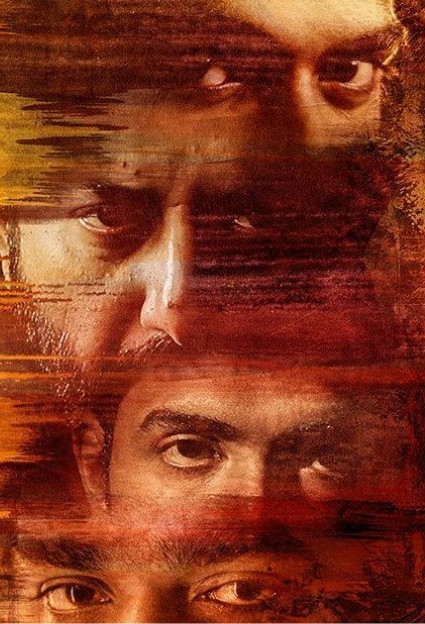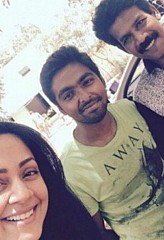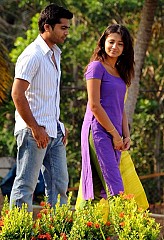

In the 1997 movie Iruvar, when the party chief Ayya Veluthambi (played by Nassar) dies, the top leaders and thousands of party members mourn it at a function. The iconic shot starts as a close-up of Tamilselvan (Prakash Raj), the wannabe chief of the party, reading a poem and grieving for Veluthambi’s death. Then, without a cut, Anandan (Mohanlal) enters the frame and starts speaking his thoughts about the leader’s demise, which hints at the ongoing tensions and an upcoming split up.
The close-up suddenly starts moving and becomes a roundabout tracking shot of Anandan and the other leaders, with the multitude of followers and the party symbol - a burning torch, in the background. The camera takes four uninterrupted rounds within the stage in a nearly three-minute-long shot. The controlled use of unusual camera movement, the ambience, the shrieking sounds from a thousand throats, the background score of a haunting male hum supported by thumping drum beats, and Mohanlal’s measured deliverance of suppressed, mixed emotions, make it one of the iconic shots of Indian cinema.
The name “Mani Ratnam” rings a clatter of such throbbing emotional sequences in every movie buff's mind. When we ponder over our reasons for the wait for a Mani Ratnam film, the most important things that surface are emotions. Very few Indian filmmakers have achieved such an avalanche of emotions by incorporating cinematic elements. Often, it’s the emotional shadow play between the characters, as in most of his movies like Mouna Ragam, Nayakan, Thalapathi, Alaipayuthey, or between the characters and history, as in Roja and Iruvar, or between the characters and an abstract idea, as in Dil Se, Aayudha Ezhuthu and Kadal, that watermarked his movies in moviegoers’ minds.
If an artist believes in inventing original stuff, then the best place to delve is in one’s own roots. Mani Ratnam always returns to the roots, with varying and debatable shades of social and political flavours, while keeping a striking balance in the commercial and artistic aspects of cinema. He achieves this feat by not just narrating the scene onscreen, but narrating the emotions latent in the scene directly to us, implying its intensity, impact and ramifications using elements like composition, lighting, camera movement, background score, and dialogues.
Most of the time, these elements work in unison to impart a deep and long-lasting feel of emotions on the viewers. Mani Ratnam often prefers to play within the grey zones, which enables him to portray the stories with a poignant ambiguity. Viewers often manoeuvre through the grey zones, where they know how they feel, but can never express it in words.
His characters also dwell in such grey zones and they always mumble or shriek when they are about converse something important in their life. Or, they communicate in monosyllables, as if they are reluctant to talk. All these particulars make them more humane, vulnerable like us, and we love them for that reason. Mari Ratnam’s passion for chiaroscuro is another example of this ambiguity of human emotions. All we can see and perceive is an outline of their mind, and the rest is in darkness, which makes us curious and tempts us to have a closer look.
It’s natural for a filmmaker like Mani Ratnam to have dialogues that hide, and emotive close-ups that reveal more about what’s going on for the characters. The same human connection of faces lures the viewers to watch those movies without giving credence to the art-commercial divide. Moreover, he is keen to layer the scripts with the socio-economic detailing of the character backgrounds. For the same reasons, Mani Ratnam can be considered not just as a filmmaker, but a true auteur of the Indian mainstream cinema.
If we dissociate the various elements of a Mani Ratnam movie, we may either fall in love with AR Rahman’s music, stunning cinematography, performances, colour palettes, or soundscapes. But, as a true auteur, he orchestrates all these elements to kindle a pure cinematic experience. In India, cinema is a vehicle to carry a philosophy, a slogan of an ideology, a feisty chatterbox, an extravagant facade, a short living banter. For Mani Ratnam, cinema is a huge canvas to paint a collage of human emotions using social, cultural and political colours.
In the haunting climax sequences of Dil Se, the male protagonist, Amar (played by Shahrukh Khan) passionately embraces the female protagonist, Moina (Manisha Koirala), who is a suicide bomber about to die. Both turn into a fireball and the frame freezes as if time stops flowing. However, both the filmmaker and his ardent fans know that all isn’t over; the weight of the very romantic, emotional obsession of exploding with your beloved, lingers. We wait for and walk into a Mani Ratnam movie because we are thirsty for such emotions, which we miss, ignore or throw away in our daily lives; and for obvious reasons, we will do the same for “Chekka Chivantha Vaanam.”
Behindwoods is not responsible for the views of columnists.

OTHER LATEST BEHINDWOODS COLUMNS
RAGESH DIPU'S OTHER COLUMNS
- Why Naachiyar is not a Typical Bala Film, but More
- From Kolaveri to Priya Prakash Varrier, And How #hashtags Grow Bigger Than the Movies!
- From Mahesh to the Fakir: The Extraordinary Journey of Dhanush
- The attacks and assaults on actresses, or should we say, women
- A question at the time of the theatre shutdown: Why are we going to the movies?
- From Anbe Sivam to Velaikkaran - How Tamil Cinema dealt with consumerism



